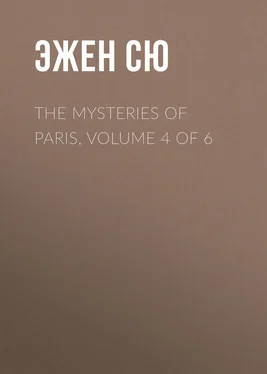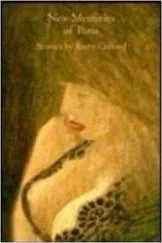Эжен Сю - The Mysteries of Paris, Volume 4 of 6
Здесь есть возможность читать онлайн «Эжен Сю - The Mysteries of Paris, Volume 4 of 6» — ознакомительный отрывок электронной книги совершенно бесплатно, а после прочтения отрывка купить полную версию. В некоторых случаях можно слушать аудио, скачать через торрент в формате fb2 и присутствует краткое содержание. Жанр: literature_19, foreign_antique, foreign_prose, на английском языке. Описание произведения, (предисловие) а так же отзывы посетителей доступны на портале библиотеки ЛибКат.
- Название:The Mysteries of Paris, Volume 4 of 6
- Автор:
- Жанр:
- Год:неизвестен
- ISBN:нет данных
- Рейтинг книги:5 / 5. Голосов: 1
-
Избранное:Добавить в избранное
- Отзывы:
-
Ваша оценка:
- 100
- 1
- 2
- 3
- 4
- 5
The Mysteries of Paris, Volume 4 of 6: краткое содержание, описание и аннотация
Предлагаем к чтению аннотацию, описание, краткое содержание или предисловие (зависит от того, что написал сам автор книги «The Mysteries of Paris, Volume 4 of 6»). Если вы не нашли необходимую информацию о книге — напишите в комментариях, мы постараемся отыскать её.
The Mysteries of Paris, Volume 4 of 6 — читать онлайн ознакомительный отрывок
Ниже представлен текст книги, разбитый по страницам. Система сохранения места последней прочитанной страницы, позволяет с удобством читать онлайн бесплатно книгу «The Mysteries of Paris, Volume 4 of 6», без необходимости каждый раз заново искать на чём Вы остановились. Поставьте закладку, и сможете в любой момент перейти на страницу, на которой закончили чтение.
Интервал:
Закладка:
"What does that last part mean, M. Rodolph?" asked Rigolette, much surprised.
"Proceed with the letter; we shall see by and by."
Rigolette thus resumed:
"'I know upon how little you can live, and of what service even a small sum would be to you in any case of emergency. I am very poor myself, but still, by dint of rigid economy, I have managed to save fifteen hundred francs, which are placed in the hands of a banker; it is all I am worth in the world, but by my will, which you will find with this, I have ventured to bequeath it to you; and I trust you will not refuse to accept this last proof of the sincere affection of a friend and brother, from whom death will have separated you when this meets your eye.'
"Oh, M. Rodolph," cried Rigolette, bursting into tears, "this is too much! Kind, good Germain, thus to consider my future welfare! What an excellent heart he must have!"
"Worthy and noble-minded young man!" rejoined Rodolph, with deep emotion. "But calm yourself, my good girl. Thank God, Germain is still living! And, by anticipating the perusal of his last wishes, you will at least have learned how sincerely he loved you, – nay, still loves you!"
"And only to think," said Rigolette, drying up her tears, "that I should never once have suspected it! When first I knew M. Girandeau and M. Cabrion, they were always talking to me of their violent love, and flames, and darts, and such stuff; but finding I took no notice of them, they left off wearying me with such nonsense. Now, on the contrary, Germain never named love to me. When I proposed to him that we should be good friends, he accepted the offer as frankly as it was made, and ever after that we were always excellent companions and neighbours; but – now I don't mind telling you, M. Rodolph, that I was not sorry Germain never talked to me in the same silly strain."
"But still it astonished you, did it not?"
"Why, M. Rodolph, I ascribed it to his melancholy, and I fancied his low spirits prevented his joking like the others."
"And you felt angry with him, did you not, for always being so sad?"
"No," said the grisette, ingenuously; "no, I excused him, because it was the only fault he had. But now that I have read his kind and feeling letter, I cannot forgive myself for ever having blamed him even for that one thing."
"In the first place," said Rodolph, smiling, "you find that he had many and just causes for his sadness; and secondly, that, spite of his melancholy, he did love you deeply and sincerely."
"To be sure; and it seems a thing to be proud of, to be loved by so excellent a young man!"
"Whose love you will, no doubt, return one of these days?"
"I don't know about that, M. Rodolph, though it is very likely, for poor Germain is so much to be pitied. I can imagine myself in his place. Suppose, just when I fancied myself despised and forsaken by all the world, some one whom I loved very dearly should evince for me more regard than I had ventured to hope for, don't you think it would make me very happy?" Then, after a short silence, Rigolette continued, with a sigh, "On the other hand, we are both so poor that, perhaps, it would be very imprudent. Ah, well, M. Rodolph, I must not think of such things. Perhaps, too, I deceive myself. One thing, however, is quite sure, and that is, that so long as Germain remains in prison I will do all in my power for him. It will be time enough when he has regained his liberty for me to determine whether 'tis love or friendship I feel for him. Until then it would only torment me needlessly to try to make up my mind what I had better do. But it is getting late, M. Rodolph. Will you have the goodness to collect all those papers, while I make up a parcel of linen? Ah, I forgot the little bag containing the little orange-coloured cravat I gave him. No doubt it is here – in this drawer. Oh, yes, this is it. Oh, see, what a pretty bag! How nicely embroidered! Poor Germain! I declare he has kept such a trifle as this little handkerchief with as much care as though it had been some holy relic. I well remember the last time I had it around my throat; and when I gave it to him, poor fellow, how very pleased he was!"
At this moment some one knocked at the door.
"Who's there?" inquired Rodolph.
"Want to speak to Ma'am Mathieu," replied a harsh, hoarse voice, and in a tone which is peculiar to the lowest orders. (Madame Mathieu was the matcher of precious stones to whom we have before referred.)
This voice, whose accent was peculiar, awoke some vague recollections in Rodolph's breast; and, desirous of elucidating them, he took the light, and went himself to open the door. He found himself confronted by a man who was one of the frequenters of the tapis-franc of the ogress, and recognised him instantly, so deeply was the print of vice stamped upon him, so completely marked on his beardless and youthful features. It was Barbillon.
Barbillon, the pretended hackney-coachman, who had driven the Schoolmaster and the Chouette to the hollow way of Bouqueval, – Barbillon, the assassin of the husband of the unhappy milkwoman, who had set the labourers of the farm at Arnouville on against La Goualeuse. Whether this wretch had forgotten Rodolph's face, which he had never seen but once at the tapis-franc of the ogress, or that the change of dress prevented him from recognising the Chourineur's conqueror, he did not evince the slightest surprise at his appearance.
"What do you want?" inquired Rodolph.
"Here's a letter for Ma'am Mathieu, and I must give it to her myself," was Barbillon's reply.
"She does not live here, – it's opposite," said Rodolph.
"Thank ye, master. They told me the left-hand door; but I've mistook."
Rodolph did not recollect the name of the diamond-matcher, which Morel the lapidary had only mentioned once or twice, and thus had no motive for interesting himself in the female to whom Barbillon came with his message; but yet, although ignorant of the ruffian's crimes, his face was so decidedly repulsive that he remained at the threshold of the door, curious to see the person to whom Barbillon brought the letter.
Barbillon had scarcely knocked at the door opposite to Germain's, than it opened, and the jewel-matcher, a stout woman of about fifty, appeared with a candle in her hand.
"Ma'am Mathieu?" inquired Barbillon.
"That's me, my man."
"Here's a letter, and I waits for an answer."
And Barbillon made a step forward to enter the doorway, but the woman made him a sign to remain where he was, and unsealed the letter, which she read by the light of the candle she held, and then replied with an air of satisfaction:
"Say it's all right, my man, and I will bring what is required. I will be there at the same hour as usual. My respects to the lady."
"Yes, missus. Please to remember the porter!"
"Oh, you must ask them as sent you; they are richer than I am." And she shut the door.
Rodolph returned to Germain's room, when he saw Barbillon run quickly down the staircase. The ruffian found on the boulevard a man of low-lived, brutal appearance, waiting for him in front of a shop. Although the passers-by could hear (it is true they could not comprehend), Barbillon appeared so delighted that he could not help saying to his companion:
"Come and 'lush a drain of red tape,' Nicholas; the old mot swallows the bait, hook and all. She'll show at the Chouette's. Old Mother Martial will lend a hand to peel her of the swag, and a'terwards we can box the 'cold meat' in your 'barkey.'" 2 2 "Come and let's have some brandy together, Nicholas. The old woman falls easily into the snare. She will come to the Chouette's; Mother Martial will help us to take her jewels from her forcibly, and then we can remove the dead body away in your boat."
"Let's mizzle, 3 3 "Let's be quick, then."
then; for I must get back to Asnières early, or else my brother Martial will smell summut."
Интервал:
Закладка:
Похожие книги на «The Mysteries of Paris, Volume 4 of 6»
Представляем Вашему вниманию похожие книги на «The Mysteries of Paris, Volume 4 of 6» списком для выбора. Мы отобрали схожую по названию и смыслу литературу в надежде предоставить читателям больше вариантов отыскать новые, интересные, ещё непрочитанные произведения.
Обсуждение, отзывы о книге «The Mysteries of Paris, Volume 4 of 6» и просто собственные мнения читателей. Оставьте ваши комментарии, напишите, что Вы думаете о произведении, его смысле или главных героях. Укажите что конкретно понравилось, а что нет, и почему Вы так считаете.












